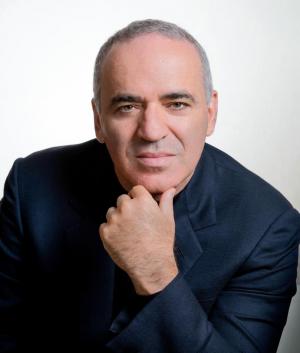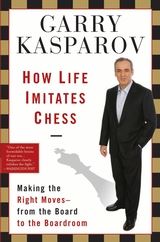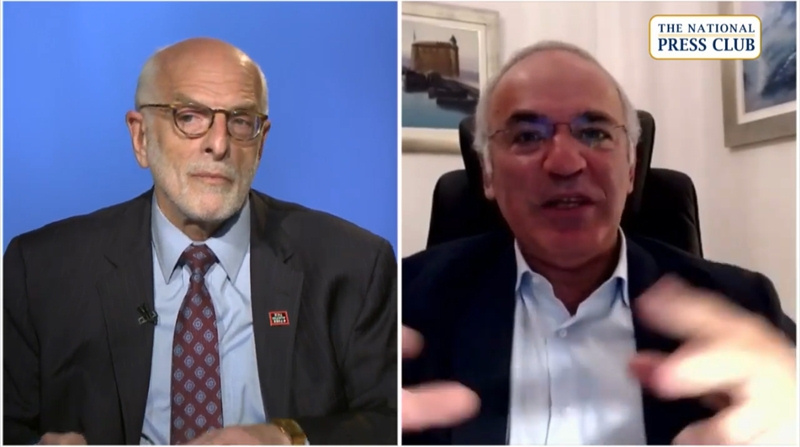
It’s a chess maxim that attacking exposes oneself to risk. In the current political climate, however, inertia is no safer than being bold. That’s according to former world chess champion turned human rights activist Garry Kasparov, who spoke during a National Press Club virtual Newsmaker Oct. 9.
“Not having courage to make a decision is even risky,” he said. “We’ve reached a point where combining global political crisis and health crisis, we have to come up with a vision.”
Kasparov was responding to a question from Club President Michael Freedman about how lessons from his unrivaled chess career might apply to human rights activism today. Kasparov said that his chess knowledge doesn’t apply directly.
“The rules in today’s politics -- geopolitics, domestic politics -- they are not as rigid as in chess, or in any other game,” he said. But, he allowed, looking at the big picture is as important for his chess playing as it is for activism. Kasparov has been a very outspoken critic of the Kremlin and the White House, and he has expressed often the need for press freedom.
Speaking with Freedman from his summer home in Croatia, with a chess set peeking out from just above his left elbow and with two washy, watercolor seascapes behind him, Kasparov in many ways couldn’t have been further removed from U.S. and Russian politics. But in the course of the hourlong discussion, he demonstrated a keen familiarity with what is going on in both countries.
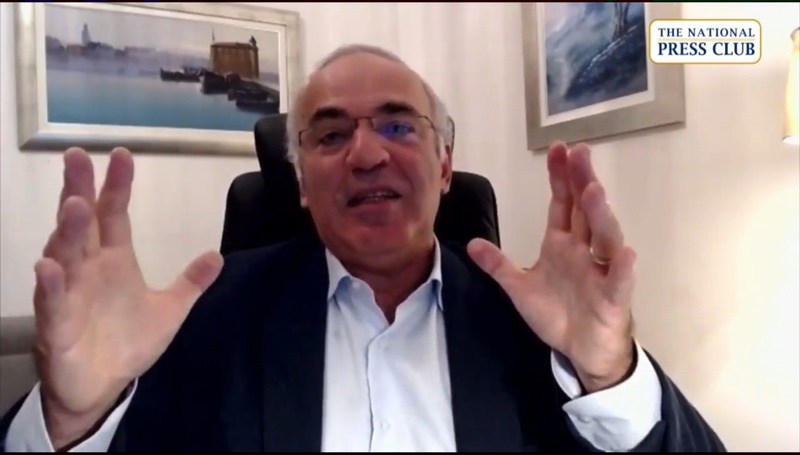
Since watching the 1988 vice presidential debate -- during which Sen. Lloyd Bentsen, who was running on the Democratic ticket with Michael Dukakis, memorably told his Republican opponent running with George H.W. Bush, Sen. Dan Quayle, “Senator, you’re no Jack Kennedy” -- while on a trip to the U.S., Kasparov has followed every subsequent debate, he said. And throughout the hour, Kasparov called Russian President Vladimir Putin a dictator who is unworthy of the title president. He said that U.S. President Donald Trump, about whom he warned as early as 2015, presents a unique danger to American democracy.
Kasparov also observed that the U.S. media enabled then-candidate Trump in 2016 and only started taking him seriously after the party conventions and after giving him extensive free airtime. Trump has wielded a kind of social media bully pulpit without recognizing that U.S. power is tied to its responsibility and leadership, Kasparov said. He thinks the damage Trump -- whom he considers a symptom rather than an anomaly -- has caused will take years to dissipate.
Although Democrats considered Trump’s candidacy in 2016 a “gift from heaven,” Hillary Clinton wasn’t electable, and Trump’s views found purchase even with prior supporters of Barack Obama, according to Kasparov. As president, Trump has violated long-standing political norms by exploiting loopholes and has been the latest Oval Office occupant since the 1970s to usurp the norms to claim more executive power.
“It’s not enough now to rely on the spirit of law,” Kasparov said. “We have to actually put in as many letters as we can.”
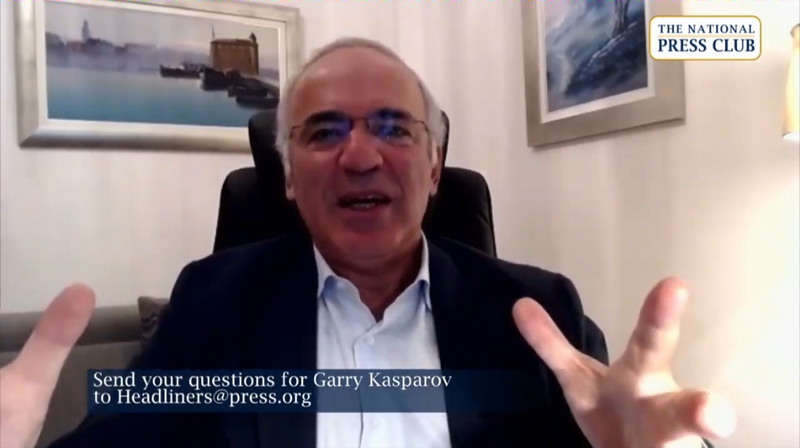
Both the prior and current elections involved many voters opting for a lesser evil, which reflects the limitations of a two-party system, in Kasparov's estimation. “That’s not the way to fix problems in the American democracy,” he said. “We have to talk about a positive agenda.”
Kasparov doled out low marks for Trump’s performance in the first presidential debate. It was the same for Kamala Harris’ in the vice presidential debate the following week. He said that even though he thought Vice President Mike Pence looked more presidential than his boss, he doesn’t think vice presidential debates have impacted history.
“It was a big disaster for Trump, because he was trailing and needed to score points,” he said.
Kasparov had harsh thoughts for Republicans, who privately criticize the president but fawn publicly. They put their party and careers tribalistically before their country, he said. “I think that’s one of the reasons American democracy is in grave danger these days.”
The large percentage of young people who report positive views of communism, and U.S. and Russian antagonism toward the press also threaten democracy, in Kasparov's analysis. When Freedman asked about Trump’s reference to reporters as “enemy of the people,” Kasparov said he thinks of former Soviet Union strongmen Lenin and Stalin.
“This is the language of Bolsheviks,” he said. “This is the language of Nazis.”
Kasparov advised reporters to fact check better and to avoid “a false sense of objectivity” at a time when Trump is playing war games. “Trying to pretend that you are neutral in this fight doesn’t serve American democracy and it doesn’t serve the American public,” he said.
In Russia, the Kremlin controls the press. “Human rights in Russia exist on paper,” Kasparov said. It will take the free world denying Putin and his allies access to international banking and trade to curtail Putin’s power, and only then will Putin-orchestrated conflicts in Syria, Venezuela, Belarus and Ukraine end, according to Kasparov.
“He believes he is above the law. Above treaties,” Kasparov said of Putin.
Asked about his own safety, Kasparov said he is careful, but that no one can save those whom Putin decides to target. “I don’t drink tea with strangers,” he said.




